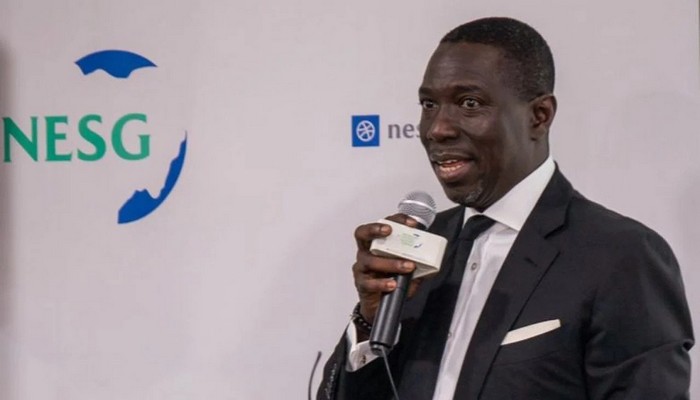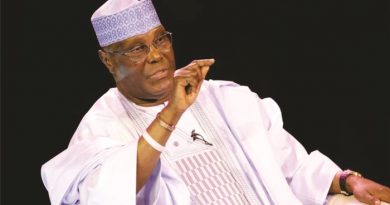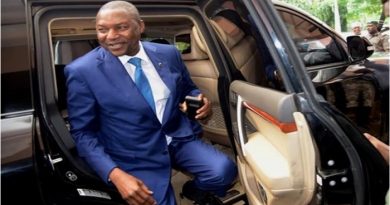More Nigerians multidimensionally poor now – NESG Chairman
- to grill presidential aspirants on economic issues
The Chairman of the Nigerian Economic Summit Group (NESG), Mr. Asue Ighodalo has lamented the growing poverty rate in the country, saying that more Nigerians are multidimensionally poor now than are monetarily poor.
Ighodalo spoke on Wednesday at the press briefing on the 28th Nigerian Economic Summit, NES£28, organised by the Federal Ministry of Finance, Budget and national Planning in Abuja.
He noted that the Macroeconomic instability in the country is driven by stagflation pushing more people below the poverty line.
He said the socioeconic pressures are accentuated by rising food inflation and a growing food insecure population that the World Food Programme puts at 61 Million as of October 2022.
This situation, according to him has over 38% of under-5 children experiencing chronic malnutrition and 70% of children suffering from Learning Poverty (lacking basic literacy and numeracy skills).
“As this year’s Summit will be held within a political transition season accentuated by impending general elections, which promise to be competitive and decisive in ushering the next administration into office.
“Our nation is in a season of social discontent characterised by massive economic pressures and challenges on businesses and citizens.
“Macroeconomic instability is driven by stagflation pushing more people below the poverty line. More Nigerians are multidimensionally poor than are monetarily poor.
“The World Bank estimates that in 2022 alone, 7 million Nigerians will go into extreme poverty.
“”These socioeconomic pressures are accentuated by rising food inflation and a growing food insecure population that the World Food Programme puts at 61 Million as of October 2022.
“Our population face significant security challenges, made worse by the devastating effects of climate change compounding already aggravated levels of humanitarian crisis,” he said.
“Nigeria’s Internally Displaced Persons Index 2021 shows that we had 3.2 million IDPs as of last year.
“This year adds an additional 1 million IDPs triggered by flooding that has not only destroyed lives and livelihoods but threatens food sufficiency and security.
“We live in a time of global instability, regional volatility, and national socioeconomic uncertainties that require that we now exceed our own expectations.
“National revenues are historically lower than they ever were. Yes, we are sandwiched between two hard-hitting economic recessions and a global pandemic. These are unusual times that characterise what could be described as a perfect storm scenario.
“These unprecedented challenges call for business unusual, governance unusual – it calls for a whole new paradigm to national socioeconomic transformation – it calls for a new level of transformational political leadership.
“Our dear country’s potential is not in doubt nor a subject of debate anywhere in the world.
“Let us be clear, we are in tough times and no matter who becomes President in 2023, there are tough times ahead, but there are also opportunities to usher Nigeria into an era of shared and sustainable prosperity,” he added.
Continuing, the NESG Chairman affirmed that, “from NESG’s macroeconomic scenarios and projections of the future, a transformational political leadership approach with a business unusual mindset, supported by a robust elite, with socially mobilized policies, the country’s situation can be transformed into the nation of our dreams.”
For him, Nigeria can in five years become a leading industrializing and reforming nation in Africa that focuses on building its State capacity and capabilities. “Our country can break free from decades-long political, policy, legislative and regulatory binding constraints.
“We can create an enabling investment climate and business environment, underpinned by a motivated, capacitated, well-resourced, world-class civil service that drives open, transparent, high-performance governance at all levels.
“We can move Nigeria decisively towards structural and institutional reforms required to unlock local content development, sub-national economic diversification, competitiveness, and growth in the medium term.
“We can make moderate and incremental progress in poverty reduction and job creation, and we can make Nigeria the dominant shareholder of FDI inflows into the African continent.
“The unstable macroeconomic space is reflected in high inflation, exchange rate volatility, constricted fiscal space, weak external reserves, and balance of payments problems. This, in addition to social and political instability, has proved the extent of Nigeria’s vulnerability to shocks,” he said.
To ensure that Nigeria gets it right in the next year’s section, Ighodalo said the NESG has put machineries in motion to grill all the presidential aspirants on economic issues with a view to preparing whoever that may emerge victorious in the contest.
He said this year’s NES#28 themed: 2023 and Beyond: Priorities for Shared Prosperity, seeks to unveil the most critical challenges for urgent attention: unemployment surge, huge infrastructural deficit, fiscal weakness, human capital and skills gap, flawed security architecture, and corruption.
This summit, he said will also delves into the causes and implications of the highlighted critical challenges.
“The Summit Sessions are designed to set an economic policy agenda for accelerated economic growth, underpinned by sustainable and inclusive development; deliberate an actionable framework for transformative political leadership and effective governance that builds the Nigerian state’s capacity to deliver dividends of democracy and build consensus on the imperatives for transforming Nigeria’s immense human capital into national productive and innovative capacity that creates a secure collective future of prosperity for all.
“It has also designed plenaries and panel sessions to debate and reach the policy consensus to transform Nigeria into a strong, inclusive, prosperous, corrupt-free, and globally competitive and sustainable economy in 2023 and beyond. Hence our theme for the 28th Nigerian Economic Summit.
“The NES #28, jointly convened with the Federal Ministry of Finance, Budget and National Planning, is anchored on this partnership imperative.
In preparation for the Summit, he stated that the NESG jointly hosted 11 Pre-Summit events between August and September across sectors and thematic areas, including Fiscal Policy, Investment, Financial Inclusion, MSMEs, and Infrastructure, amongst others.
The summit holds between November 14th-15th, 2022.
He therefore sought the continued media engagement, and professional coverage of the 28th Nigerian Economic Summit.
In his address, the Minister of State for Finance, Budget and National Planning, Prince Clem Agba said the NES has become a model for Public Private Partnership, having held for the past 27 years and has shaped the economic policies of the country.
Prince Agba said that the Federal government is targeting an $11 trillion GDP by 2050, a vision it expects to materialise by the targeted year.
On implementation of recommendations of precious summits, the minister said the Federal government has identified 18 laws that need to be amended so that private sector can not only run but fly with with the economy.
He also said a steering committees has been set up to coordinate implementation of the National Development Development Plan, having picked low hanging fruits from previous editions and sent the bill to National Assembly for legislative action.
The minister also informed that the government is working on a succession legislation soi that when a new administration cones in, it would not jettison ongoing projects from the previous government.
Agba, who said the administration had one well inn area of infrastructure, however, disclosed that the President will on November 17th, 2022 unveil the report of the survey conducted by the ministry off Finance on poverty rate across the 109 senatorial districts in the country, which is a response to the recommendations of previous NES.
Credit: Vanguard




